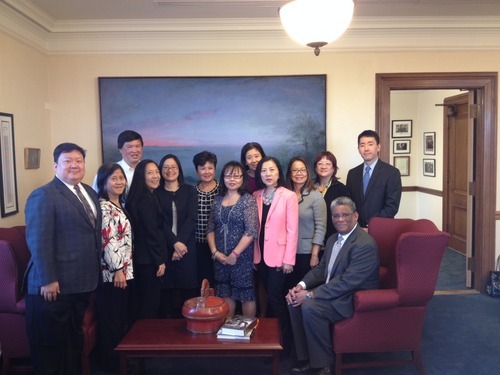FOR IMMEDIATE RELEASE March 5, 2014
Contact: Emily Chatterjee (202) 775-9555
NAPABA Celebrates Confirmation of Vince Chhabria
to the U.S. District Court for the Northern District of California
WASHINGTON — On March 5, 2014, the Senate confirmed Vince Chhabria by a 58-41 vote to a seat on the U.S. District Court for the Northern District of California. He is the first person of South Asian descent to serve as an Article III judge in California’s history, and only the third South Asian American federal district court judge nationwide.
“NAPABA congratulates Vince Chhabria on his historic confirmation and is proud to have supported him in the nomination and confirmation process,” said William J. Simonitsch, president of the National Asian Pacific American Bar Association (NAPABA). “We applaud President Obama, Senator Boxer, and Senator Feinstein for their continued commitment to diversity on the federal judiciary, and their support of this nomination.”
Since 2005, Judge Chhabria has served as a deputy city attorney in the San Francisco City Attorney’s Office, where he is the co-chief of appellate litigation. Prior to public service, Judge Chhabria spent several years working in the private sector in San Francisco. After law school, he clerked at all three levels of the federal courts, including clerkships with Judge Charles R. Breyer on the U.S. District Court for the Northern District of California, Judge James R. Browning on the U.S. Court of Appeals for the Ninth Circuit, and for Justice Stephen Breyer on the U.S. Supreme Court. Judge Chhabria has distinguished himself during his career, receiving honors from the California Daily Journal, the International Municipal Lawyers Association, and NAPABA. He is a longstanding member of SABA-NC, an affiliate of NAPABA, which has strongly supported Chhabria’s nomination.
Judge Chhabria’s confirmation increases the number of active Asian Pacific American Article III judges to 22 nationwide: 4 federal appellate court judges and 18 federal district court judges.
Three more Asian Pacific American Article III judicial nominees are pending in the U.S. Senate: Manish Shah, nominee for the U.S. District Court for the Northern District of Illinois; Indira Talwani, nominee for the U.S. District Court for the District of Massachusetts; and Theodore Chuang, nominee for the U.S. District Court for the District of Maryland. NAPABA urges the Senate to move quickly to confirm these well- qualified individuals.
###
The National Asian Pacific American Bar Association (NAPABA) is the national association of Asian Pacific American attorneys, judges, law professors, and law students. NAPABA represents the interests of over 40,000 attorneys and 67 national, state, and local Asian Pacific American bar associations. Its members include solo practitioners, large firm lawyers, corporate counsel, legal service and non-profit attorneys, and lawyers serving at all levels of government. NAPABA continues to be a leader in addressing civil rights issues confronting Asian Pacific American communities. Through its national network of committees and affiliates, NAPABA provides a strong voice for increased diversity of the federal and state judiciaries, advocates for equal opportunity in the workplace, works to eliminate hate crimes and anti-immigrant sentiment, and promotes the professional development of people of color in the legal profession.



